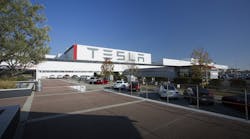In an attempt to establish itself as a clean energy giant, Tesla Motors has offered to buy SolarCity, one of the largest makers of residential and commercial solar panels. The deal, which was proposed yesterday, would be valued in the neighborhood of $2.8 billion.
Tesla’s board of directors sent a letter to Lyndon Rive, the chief executive of SolarCity, with a proposal to buy the company’s stock in exchange for Tesla shares. The company offered between $26.50 to $28.50 per share, or about 21% to 30% higher than the closing price of SolarCity’s stock yesterday.
Tesla said that the merger would make it capable of both gathering energy and putting it to work inside electric vehicles. The solar panels on top of houses, businesses, or factories could provide cheap electricity, while additional energy would be stored inside batteries, which could be used to power anything from electric cars to entire buildings on cloudy days.
"We would be the world's only vertically integrated energy company offering end-to-end clean energy products to our customers," Tesla said. “Culturally, this is a great fit. Both companies are driven by a mission of sustainability.”
It is the latest attempted splash for Tesla and its Brunellian chief executive Elon Musk. Once preorders for the Model 3 vehicle reached the 300,000 mark, Musk pledged a dramatic increase in production to meet demand. Tesla has also completed part of its Gigafactory battery plant in Nevada, which is being designed to produce cheap, plentiful batteries for new electric cars.
Tesla has also taken steps to make charging vehicles more compatible with renewable energy. Earlier this year, the company introduced the first Powerwall and Powerpack products—stationary batteries for houses or businesses that store renewable energy. They were intended to be sold to SolarCity and other solar companies.
Tesla said that combining the two companies would expand the market for solar panels and electric vehicles, with the Tesla brand opening new sales channels for SolarCity. “Those who are interested in buying Tesla vehicles or Powerwalls are naturally interested in going solar, and the reverse is true as well," the company said.
The deal also adds layers of complexity to the relationship between the companies’ executive ranks. Lyndon Rive and his brother Peter Rive, SolarCity’s chief technology officer, are cousins with Elon Musk, who holds the largest number of shares in both companies. SolarCity’s chief financial officer Brad Buss serves on Tesla’s board.
SolarCity was founded in 2006. The business grew quickly, with Musk serving as chairman of the San Mateo-based company. In 2007, it became the largest provider of residential solar panels in California and the largest in the United States by 2013. It also provides solar products for commercial and industrial use.
In 2014, SolarCity began construction on a new manufacturing plant in Buffalo, New York. It is expected to be the largest in the United States and to drastically reduce the cost of making the photovoltaic cells used in solar panels. The project’s completion has been pushed back to early 2017, however, as the company awaits special equipment for producing the cells.
“This is something we’ve been thinking about and debated for many years,” Musk said in a press call, according to technology news site Recode. “I personally think this is a no-brainer.”
Investors have been split over the deal. The solar industry has been spurred by falling prices for hardware, including modules and inverters for converting solar power into usable form. But in recent years, SolarCity has fallen into the same mire as other companies like SunEdison and Abengoa, once darlings of the solar industry. Both recently filed for bankruptcy after years of exhaustive spending and fading government subsidies.
SolarCity followed a similar script but has survived. On its quarterly earnings calls, executives trumpet the growing number of solar panels it has installed around the United States. But its share price has fallen steadily over the last 12 months and the company has racked up around $2.6 billion in debt and losses.
The deal is subject to the approval of shareholders. The boards will also vote on the deal, though several members on both sides of the negotiation will not take part. Antonio Gracias, the chief executive of venture capital firm Valor Equity Partners, who serves on both boards, will not vote. Neither will Musk and Lyndon Rive.
“I’m really excited about this. There are tremendous synergies between these two companies,” Lyndon Rive said in an email to employees, but added that ultimately shareholders control the fate of the deal.
Looking for parts? Go to SourceESB.

